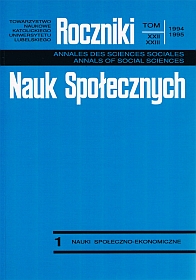Wealth and Poverty in the Light of the Christian Thought of the First Three Centuries
Abstract
Drawing on the texts from both the New Testament and the early Christian writers - Hermas Tertulian, Orygene, Alexandrian Clement, St. Cyprian, Laktancian - the paper outlines two intellectual, ascetic and rigoristic, and solidaristic trends. They modulate the then opinions of Christians on the issue of the property disproportions and decent usage of the owned things. In view of the fact that payment on behalf of the poor, either directly or indirectly, that is through the bishop and the communal Treasury, and due to its purely consumptive character of community in using material goods one cannot speak of any "communistic" character" of the milieus under question, even in extreme situation. One may and should, however, talk about "communionistic" orientation and an analogical practice of the faithful. The poor and rich turn out to be in need of one another, they are doomed to symbiosis, the more so that in the supernatural order it is the rich man who is poor, while those who are lack the material good abound with God’s grace, which they entreat, or at least may easily entreat both for themselves and for those thanks to whom they do not suffer utter privation as to that which their bodies need.
Copyright (c) 1995 Roczniki Nauk Społecznych

This work is licensed under a Creative Commons Attribution-NonCommercial-NoDerivatives 4.0 International License.


